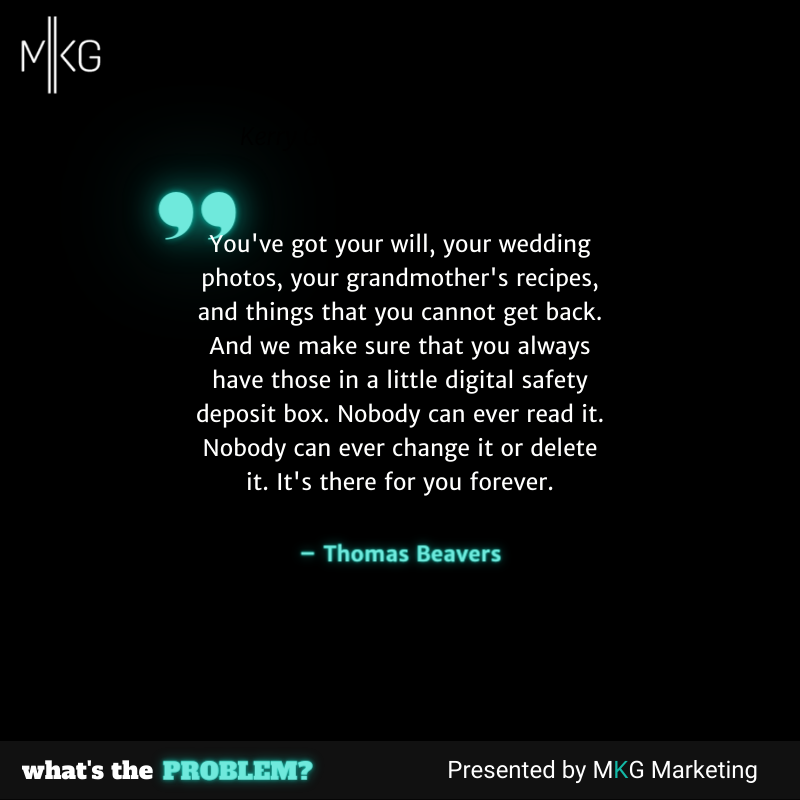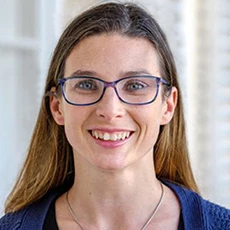Transcript
Opening
Hello and welcome to What's the Problem? the podcast where we dive deep into the most pressing issues facing cyber and data security leaders today. In each episode, we are joined by expert guests who share their insights and their experience on the challenges they face in the world of cyber or data security.
Whether you're a seasoned veteran or a new leader in the field, this podcast provides valuable info and some strategies to get your organization to the next level.
Join us as we explore the ever-evolving landscape of cyber security and data security and discover new ways to tackle the problems that are keeping us up at night.
Today, we are joined by Thomas Beavers of Sollensys.
Conversation
Mike Krass: Now Thomas, say hello to our guests.
Thomas Beavers: Hi Mike, hi guests, my name is Thomas.
Mike Krass: Very glad to be here today. We are happy to have you as well. The first question is always the same for all of our guests. Thomas, tell our listeners why you're qualified to talk about security.
Thomas Beavers: I've been working in these security space for about four years now. I started as a blockchain programmer. And while most people may attribute blockchain directly to crypto, that's not quite the same. I'm focused on the actual security part, which makes crypto possible. I started out as a blockchain programmer and moved into becoming a technical writer to explain our product to customers. And now I'm in marketing. I know blockchain in it from every angle.
Mike Krass: That's awesome. This is our first guest expert who can speak to blockchain. So definitely want to keep those ears open while we speak today.
Thomas, you and I were talking earlier and you were saying some crazy stuff. You were talking about these regular cloud storage companies, like your Dropbox of the world and Google Drive, kicking around some security issues and concerns that we both had there. And you said something that stuck with me. So let's start there. You said the future of secure cloud storage is blockchain. Tell us more about that.
Thomas Beavers: Absolutely. It truly is with the cloud storage that everybody is using currently. Yes, it's convenient. Yes, it makes it very easy for your teams to get files to each other and all that. But it also makes it just as easy for cyber criminals to take control of your data and either ransom it back to you or use it to hurt your company in other ways or even damage your reputation. Blockchain is a different storage system that essentially allows your data to be kept in a quantum state. It doesn't exist until you access it.
Anyone that has access to say they do happen, hack one of the servers and retrieve a bunch of information, it's having three letters out of the Magna Carta. You can't reproduce the entire thing from that. You would have to have every server on every network and it's just not possible with the technology we have currently.
Mike Krass: Now, not all of our listeners are blockchain programmers and also marketers. You've got a unique skillset there. If things like Dropbox or Google Drive or whatnot are easy to use. How are we like the lay public as opposed to using something like blockchain for cloud storage when as you said yourself? There are still a lot of people out there that think that crypto and blockchain are the same things or very much similar. How's the average public going to use this in the future?
Thomas Beavers: What's the vision for that? We've taken steps on that vision. We now offer an individual product called Selenium, which allows users to upload there, think of it as an indestructible storage vault. You've got your will, your wedding photos, your grandmother's recipes, and things that you cannot get back. And we make sure that you always have those in a little digital safety deposit box. Nobody can ever read it. Nobody can ever change it or delete it. It's there for you forever.
Mike Krass: So that's how we're bringing it to another concern that I think I've heard just through conversation is, blockchain and or crypto. Let's not talk about crypto. Just talk about blockchain. If you lose the information to locate, those files there isn't an 800 number on the back of your debit card that you can call. Does your product also have some sense of customer support for people that are using it and experiencing issues?
Thomas Beavers: We do have a robust customer support division. We work with you to make sure that you have everything you need. But in the very end, if you lose your password or forget your password without having a secondary backup account that can access that account, it's inaccessible. And that's the beauty of our security level. Nobody can ever access that, but the danger of it as well is if this is safe, for instance, do you pass away and forget to write that down for anybody? Those files are your retrieval.
Mike Krass: Interesting. The key here is you've got to remember your password. That's the one thing that somebody like Sollensys cannot help you with. You've got to be able to remember that password.
Thomas Beavers: That's great. We do have some safeguards in place for some of our larger customers to where they have an additional login account that is not given to anybody. It's just kept in our vaults so that in case somebody does lose their password, we can go back and get that for them. We're looking at implementing something like that in the future for our product, but at the moment, it's up to the user.
Mike Krass: Let's talk about the audience. Is this a business product? Is this a consumer product like a life lock or a life alert 360 type thing that's using something like a blockchain storage solution?
Thomas Beavers: Well, actually we've worked with different government agencies. I can't talk about who, but we're on several different government programs right now that use us for their data archival services, and several small to medium-sized businesses as well use us. And we have some smaller individuals out there selling as well.
Mike Krass: Okay. I never underestimate the power of just doing absolutely nothing. I listened to this episode like that. It sounds like a safe idea.
No, I'm not gonna do anything about that. Human beings have very strong willpower to do nothing and to take no action when they hear a story like this. So what could be the consequences of just doing nothing saying this Thomas guy and this Mike, who knows what they're talking about?
Thomas Beavers: I'm just gonna go back to Dropbox and live my life. Well, being a security-based podcast, your viewers would know that ransomware and cybercrime is going through the roof right now, and especially with the issues in Russia, the cybercriminals are just blaming everything on the Russians and doing whatever they want. And it's kind of getting back to the. The old Wild West days. You can see it everywhere in our country. We have government offices every day being hacked. The airline was just shut down a few weeks ago for all air traffic for 12 hours because they got hacked. There is not the technology that cyber criminals are using is constantly evolving. You will never be 100% safe with your cybersecurity. It just won't happen. There will always be some flaws to exploit. We're there in case something goes wrong and it doesn't have to be a cyber attack either. It can be an earthquake or any natural disaster short of an extinction-level event. Your data will be safe, so you never lose your wedding photos. You'll never lose your company data, depending on what you want to use this for.
Mike Krass: I like that. That's going to be the quote on this episode, which is, barring an extinction-level event we've got you covered, which doesn't sound like somebody a consumer-grade storage solution like a drop box or whatnot could prepend.
Thomas Beavers: Exactly. I believe that everybody has the right to have their data and have it protected and not have to worry about somebody coming in and stealing. Our CEO actually started this whole thing, trying to figure out a way to recover his mother's computer information. Because somebody had gotten in with a virus and cleaned out over info. And he just got tired of seeing it happen to people.
Mike Krass: And that is a very close-to-home story. Thomas, thank you so much for joining us.
Outro
And that's a wrap on this episode of What's the Problem? We hope you found our conversation with Thomas to be insightful and informative. Remember to tune in next time for more discussions on the latest challenges in cybersecurity or the future of cybersecurity we're talking about here at the future is blockchain.
Also, want to give a quick shout-out to our host company, MKG Marketing. MKG is focused on helping cybersecurity companies get found, get leads, and close deals.
If your cybersecurity firm is struggling to generate leads or close deals, let us help you. To learn more, you can visit us at mkgmarketinginc.com.
Thanks again for listening.
Don't forget to subscribe and leave a rating for the podcast. We appreciate that support.

Thomas Beavers
Thomas is a social entrepreneur, professional mediator, skilled web designer, and Master's student with degrees in International Development and International Studies, minors in Finance and Economics, and a focus on East Asia. He is a blockchain programmer who currently spends his workdays as a marketing lead at Sollensys Corporation.





